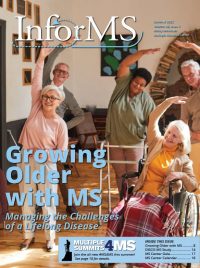
Growing older with a chronic disease is a fairly common experience, with many older adults living long and relatively healthy lives with a wide variety of conditions that can make things more complicated.
But with MS we’re faced with some unique challenges. As MS impacts our central nervous system — the brain and spinal cord, in particular — the normal process of aging is doing the same. In addition to the direct damage MS can do on its own, it can also hamper our natural ability to compensate for the normal aging process.
In this issue of InforMS, we explore the science behind aging, how it relates to MS, and what we can do to protect ourselves and promote brain health that can resist the dual impacts of MS and the natural process of getting older. Later in the issue, we’ll look at results from the DISCO-MS study, which aimed to see if and when it’s reasonable for an older individual with MS to stop taking a disease modifying therapy (DMT) to treat MS.
Managing the Challenges of a Lifelong Disease
The Science of Aging
It seems like the concept of aging should be pretty easy to understand – everybody’s getting older every day, after all. But when we’re discussing aging as it relates to MS, we’re talking about the brain and the rest of the central nervous system – and nothing about that is simple.
Before we take a deep dive into aging with MS, let’s start with a quick refresher course on a few important concepts related to brain health.
Neurological reserve refers to the capacity of the brain to compensate for damage without loss of neurological function. When an injury, toxin or disease damages part of the brain, our neurological reserve helps the brain compensate and keeps us functioning normally.
Two components work together to function as neurological reserve: brain reserve is the passive part of the puzzle, describing physical characteristics like brain volume and number of neurons we possess; cognitive reserve is the active part, describing the ability of the brain to compensate for damage by activating pathways to make up for and avoid areas of damage.
Neuroplasticity or neurological resilience is closely related to the concepts above, and refers to the brain’s ability to repair itself after damage has occurred. More than simply compensating for damage or avoiding damaged areas, neuroplasticity allows the brain to repair damage and recover function after an injury by building new pathways and connections within the brain.
In simple terms, you can think of neurological reserve as the protection or defense of your central nervous system, while neuroplasticity is the repair mechanism.
You may have heard long ago that we humans only use about ten percent of our brains – that’s not quite accurate, as we understand things today. It’s also been said that the brain can’t be repaired – we now know that’s not exactly true, either. Our deepening understanding of the concepts of neurological reserve and neuroplasticity have relegated those ideas to medical history.
What we know now is that adults are losing brain volume, beginning usually around their 30s, and that that’s a natural and normal process – called brain atrophy – that accelerates as we age. We also know that there are important things we can do to mitigate these natural effects, slow the loss of brain volume and promote neuroplasticity – central points in the MS Center’s philosophy of maximizing lifelong brain health.
What Does the Science Mean for Someone With MS?

MS, as we know, is a disease of the central nervous system. Because MS attacks the brain, MS activity is closely intertwined with the concepts of neurological reserve and neuroplasticity.
In 2019, an article published in the journal Neurology, Neuroimmunology & Neuroiflammation, found that in people living with MS, the disease is contributing more to that loss of volume than normal aging. Over time, MS seems to lessen its effect as normal aging-related atrophy increases.
Earlier studies have shown that the rate of annual brain atrophy measured on an MRI can be as much as 6 times faster in MS patients than in people without MS, a difference of between 0.1 – 0.4% in those without MS compared to 0.5 – 1.35% in those diagnosed with Relapsing Remitting MS.
This can mean two things for MS patients:
First, you’re using more of your neurological reserve than the average person as your brain attempts to compensate for the effects of MS; and
Second, because of this decreasing brain volume, your brain can’t protect itself from MS on its own as effectively.
We often hear that the majority of MS attacks or exacerbations are “clinically silent,” meaning a person who’s having an MS event shows and feels no outward signs. This could be a function of where that attack is happening, or neurological reserve protecting the brain and compensating for the MS, or a combination of the two. The result is, even without symptoms manifesting in a way that we would call an “exacerbation” or something needing attention from our medical team, MS can be active and impacting our neurological reserve.
In recent years, advancement in MS disease modifying therapies have given us more tools to fight brain atrophy, giving younger and newly-diagnosed people the chance to live more normally for longer than people who were diagnosed many years ago.
But without treatment, the effects of decreased brain volume can lead someone with MS to progress through different stages of the disease more quickly. And, because brain atrophy is known to be the best predictor for potential future disability, that increased level of brain atrophy has the potential to lead to MS-related disability.
Therefore, as MS patients age, we know that their experience in the early years with the disease is likely to have an effect on their later years.
When Does MS Start, and When Does it End?
MS is usually diagnosed between the ages of 25 and 40, though there are cases of both young children and older adults receiving a diagnosis.
In the case of older adults, it’s not uncommon for a diagnosis later in life to be the result of simply not being diagnosed earlier, rather than a case of MS manifesting spontaneously in an older person. Every person’s disease experience is different, and sometimes a person can live for many years without experiencing significant symptoms – in such cases, it’s not uncommon to not be diagnosed until more severe symptoms manifest.
MS is a chronic disease, not a terminal one. Although MS is associated with a slightly shorter lifespan, it is not something that typically directly leads to death.
Studies in the past have shown only a slight difference in life expectancy among MS patients and the general public, and that’s usually associated with a person’s level of disability or other complications that may be related to their MS, but not MS itself.
As medicine in general has advanced, life expectancy has gotten longer in the wider population, and the same has happened for MS patients. With new treatments that can slow or even stop disease progression, it’s widely accepted that on average MS patients will live just about as long as those without MS.
But, of course, there’s a wide population of people living with MS who were diagnosed and began treatment before modern drugs were available.
New MS activity can significantly slow or even stop as MS patients age. There are likely a number of reasons for this, including a change in natural history of the disease (less relapses) and treatment with disease modifying therapies. Some MS patients, however, even when not having relapses, will have slow progression of disability. When preceded by relapses when younger, this is termed secondary progressive MS (SPMS). When not preceded by relapses, we call this primary progressive MS. Patients with either form of progressive MS tend to have significantly less favorable response to presently-available disease modifying treatments (DMTs). Thus, as people age, the present DMTs may be somewhat less necessary (if patients are stable with no relapses or slow progression), or less effective (if having slow progression of symptoms without relapses).
This has raised significant questions in recent years about whether or not it’s appropriate for older adults to stop taking their MS meds at some point.
MS drugs can be quite expensive. They can also cause some significant side effects and risks. When we prescribe – or continue to prescribe – MS drugs, it’s important to weigh the potential benefits of the medication with the potential risks it poses for each individual patient.
As we age, we begin to deal with many effects of the normal aging process, which can range from simple things like loss of strength and stamina to more complicated situations like various different illnesses and conditions – unfortunately, living for decades with MS doesn’t make us immune to other health issues.
Dr. John Corboy, Medical Director of the Rocky Mountain MS Center, recently presented initial findings of the DISCO-MS Study – “DISCO” meaning “discontinuing” MS drugs. The study spent years observing a number of older MS patients, some who stayed on their DMTs and some who stopped taking them. For a detailed update on these results, look for our interview with Dr. Corboy later in this issue, or find his recent webinar on the subject at www.mscenter.org/webinars.
What Can We Do About It?
There are a number of things we can do as we age to protect ourselves against the effects of MS, deal with the effects that arise despite our efforts, and maintain a high quality of life.
Let’s go back to the science of the brain. Neurological reserve is something we can protect throughout our lifetime by healthy living. Regular exercise, eating a balanced diet, not smoking, avoiding and treating co-morbidities (ie, other conditions such as diabetes, high blood pressure, obesity and others), and sticking with our MS treatments can all promote overall brain health as we age.
Neuroplasticity can be bolstered in much the same way, but also by staying active and engaged. Reading books, socializing with friends, playing a sport, playing card games, doing crossword puzzles, or taking an online educational course can all help exercise our brains and build the resilience we need to help our own bodies repair damage done from both normal aging and MS.
Symptom management that’s effective and consistent can greatly improve our overall quality of life. While DMTs work to slow MS itself, we must also be aware of and diligent in treating the symptoms we’re able to deal with.
For more information, check out these recent issues of InforMS Magazine: “Exercising Your Brain” (Spring 2019) and “Food for Thought” (Fall 2020).
Practical Interventions
Use assistive devices if you need them. You may not “need” a cane or walker, but getting a little assistance in your daily routine tasks can help with your mobility, ease fatigue, and help you maintain independence. If you are falling, nearly falling, or have a fear of falling, you may be a candidate for an assistive device. Physical therapists are the experts who help make decisions about the utility of assistive devices. Take advantage of what’s out there to help make your life easier.
Manage your medical team. MS is an important factor in your life, but it’s not the only one. Ensure you’ve got a primary care physician who understands that you’re not just getting older – you’re getting older with a complicated companion. And make sure that your MS care team is aware of any underlying conditions you may also be dealing with. Never assume that either your primary doctor or your MS team knows everything that’s going on with you – be thorough when you talk to them, and keep medical records handy from one appointment to the next. Also, do not assume, or let your doctors assume, that just because you have MS, it is the cause of every new problem you may encounter. MS does cause many issues, but it does not protect you from cancer, heart disease or slipped discs in your back. Keep an open mind.
Be mindful of your mind. Depression is a common symptom in MS, especially in newly-diagnosed individuals. But it can also affect people who’ve been living with MS for many years. Your mental health is as important as your physical health, and screening for depression on a regular basis can help get you the help you need, if and when you need it. Treatment for depression does not have to be long-term. Sometimes treatment is used to get you over a hump and then you can reevaluate your needs.
Get the help you need, and provide support for the people helping you. Caregivers that we can rely on are critical for all older adults, and especially those of us living with MS. Ensure you have someone or a small network of people you can rely on. Often times as we age, this caregiver will be a spouse or partner who’s aging along with us – it’s important to monitor their health and well-being as well.
Planning, Pacing and Patience. Research shows that older individuals are able to maximize their mobility and independence by planning ahead, pacing themselves, and being patient with their own bodies. Be diligent about ensuring any activity you’re undertaking is well thought-out, and that you’re not pushing yourself beyond your limit. Take things as slowly as you need to and you’ll be setting yourself up for success.
Take advantage of community programs designed for older adults. Most communities have an exhaustive list of services and programs designed for older adults, and can easily accommodate the needs of those living with MS. These can range from social activities to educational opportunities, arts and crafts to sports, and countless other things to do. Find your local Area Agency on Aging (AAA) to be connected with everything from recreational programs to medical and transportation assistance.
Plan and prepare for the future. Getting yourself and your family prepared for what’s to come is important for all older adults. This includes having proper legal preparations in order, like wills and trusts, and ensuring someone in your life knows how and where to access them if needed. It’s also good to have a plan in the event that assisted living or nursing care becomes necessary. These conversations are never easy, but having plans in order can set your mind at ease and help your loved ones know exactly what you want in the event that these measures become necessary.
Conclusion
Growing older with MS is a reality that all of us, including MS patients, will face, and one that an ever-growing number of people are facing as our entire population tends to live longer. Strategies focused on a generally healthy lifestyle earlier in the course of your MS can help mitigate long-term impacts of the disease. As you grow older, and even if MS progresses, it’s still possible to manage your experience with the disease effectively with many of the same strategies focused on healthy living, and physical and emotional wellbeing.

